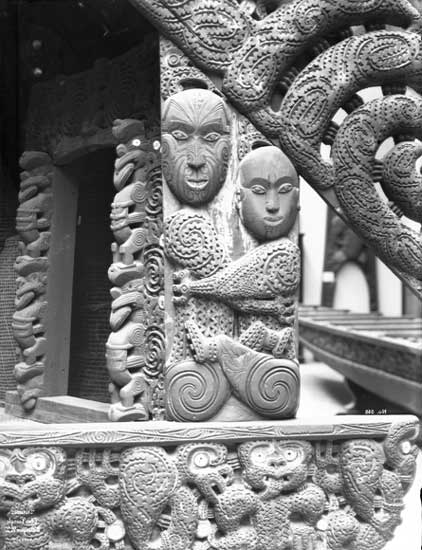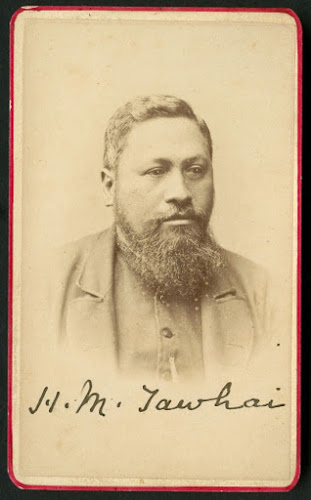The Origins of the Maori King Movement - An Insider's Account
There are multiple
accounts as to the origins of the Kingitanga, or Maori King Movement, which came
to prominence with the instalment of Potatau Te Wherowhero as the first Maori
King in 1858. Much less common is a detailed insider’s description of the
emergence of the movement and its aims and objectives. Honana Te Maioha
belonged to Ngati Mahuta and was a cousin of Matutaera, better known as King
Tawhiao, the second Maori King. He was intimately involved in the Kingitanga
and had been active in its formation. In 1882 he gave a detailed description of
how the movement had come about. It emerged at a time when the Kingitanga was
at the forefront of public attention. The year before King Tawhiao had laid
down his arms at Alexandra (Pirongia) and declared an end to the war fought in
the 1860s. Subsequent to this he travelled to a number of European settlements,
includiing, in January 1881, to Auckland. There, Tawhiao and his entourage,
including Honana Te Maioha, were feted by a grateful public and it was during
this time that Honana was interviewed by a reporter from the New Zealand Herald on the origins of the
movement. It was reproduced in a number of colonial newspapers under the
heading ‘Story of the King Movement, Told by a Maori Chief’. This is his
account:
++++++++++++++++++
On the occasion of the recent visit of the Kingites to Auckland, a reporter from
the Herald interviewed Honana te
Maioha – one of Tawhiao’s near relatives, who took an active part in the
commencement of the King’s movement – with the view of having recorded facts
respecting that singular series of events.
Honana states that
the people of Kawhia were the first, so far as he knows, to entertain the idea
of a King for the Maoris. Those who first spoke about the subject were the
Ngatihikairo, the chiefs being Waikawau and Pikia. This was before Te Rauparaha
was taken by Sir George Grey [in 1846]. The objects of the King movement were
these: - 1. To form a bond amongst all the tribes of New Zealand. 2. The desire to form
a land league, to stop the reckless alienation of land. 3. To prevent fighting
and bloodshed among the Maoris. Honana continued: Potatau, when spoken to by
the people of Kawhia, said, “It would not be right for you to call me to be a
king, because I am simply a connection of Waikato,
and a great many other tribes are interested in a matter of that kind.” At that
time Potatau was living at Awhitu, on the Manukau. He would not consent to be
made a king. Afterwards, Tamehana te Rauparaha and Matene te Whiwhi, of
Ngatiraukawa, at Otaki, went to Rotorua. Their action was quite separate from
that of the people of Kawhia. At the great meeting at Rotorua, the speaking was
to this effect: - Ko Rotorua he moana kopuapua – Rotorua is a place of ponds,
meaning that the sun would soon cause them to evaporate; ki Taupo, he moana
papaku – Taupo is a shallow sea, meaning that the people were not many, and more
scattered; ko Waikato, he awa taniwha – Waikato is a giant river. The meaning
of all this was that the king should be selected from Waikato.
This was during the first Governorship of Sir George Grey. Hikairo had then
been spoken of as king. Then was the time that Heuheu te Iwikau built the great
pataka (storehouse), which he called “Hinana ki uta, hinana ki tai” – staring
inland and staring to the sea. Potatau was invited to the meeting. He was then
living at Whatawhata. He started to go to Taupo, but when he had got to Orakau,
he had a fall from his horse, and was in consequence unable to proceed. Tawhiao
(the present king) went, Honana te Maioha, Paratene te Maioha, Takerei, Te
Huirama, Waikawau, Pungarehu, Hikuroa. The name of Tawhiao was then Tapuke (not
Te Pupuke, as we have already printed it). There was present the Roman Catholic
priest who resided at Rangiawhia, Father Garavel, and the Rev. Mr Grace, who
was the resident minister of Taupo. Representatives of the Ngatiraukawa, the
Ngatikahungunu, the Arawa, the Ngatituwharetoa, and other tribes attended. A
post was erected by order of Te Heuheu, and ropes fastened to the post. One
rope pointed to Taupiri, in Waikato, one to
Hawke’s Bay, and so on. Tongariro was the post itself, and the various ropes
represented numerous tribes, including the Waikatos. Rewi was at that meeting.
Te Heuheu ordered the ropes to be placed in the hands of different men, and
before they did so, said “Potatau is King.” Patara te Tuhi said, “Why do you
ask your son to stand as king? You should be the king.” Rewi rushed forward and
took one of the ropes, and Matuahu took one and called out the chorus, “Toia te
waka” (Drag the canoe). Hawrua [sic], one of the Ngatimaniapoto, spoke on that
occasion and said he desired that Potatau should be king. He came forward with
a sovereign in his hand and presented it to Potatau, in order to declare to him
that our own native feuds were at an end. The Whanganuis joined, and there was
perfect unanimity. Turoa was the representative of Whanganui, and Tareha and
Paora Kaiwhata of Ngatikahungunu. The arguments of Te Heuheu for establishing a
king were that the Maoris might hold the land, and that the shedding of blood
by native quarrels might be avoided. Te Rangikaharua came forward and sung the
ngeri, “Tenei te tangata puhuruhuru.” That referred to Potatau. We were
unanimous at that meeting that Potatau should be elected. (An extract from the
Rev Mr Buddle’s book was here read by Honana, where the author states that at
the Taupo meeting “the most violent party advocated a clear sweep of all the
pakehas, governor, missionaries, pakeha maories (settlers) – all.”) That is not
true. Mr Buddle was not present at the Taupo meeting. There was no such thing
advocated. We did not want to interfere with the Europeans. The movement was
for our own people only. It was not till after this that someone said that the
Europeans would be angry if we elected a king. It was replied, “Why should
they, seeing that we in no way interfere with them?” Another meeting was held
at Patea, between Hawke’s Bay and Tongariro. It was decided that the whole of
the Rangitikei river should be offered to the king to be protected. Potatau had
not agreed to accept at that time. Then a meeting was called at Rangiawhia, and
there it was unanimously agreed that Potatau should be king. By this time he
had gone to reside at Mangere. Up to this point William Thompson had not taken
any part in the king movement. Potatau did not consent as he was not sure of
the opinions of the whole people. He never desired the office, thinking that
his own dignity as a chief was sufficient. Tawhiao was then living with him at
Mangere. This next thing was the meeting at Waiuku. Potatau made a speech,
saying “Adhere to Christianity, and to love, and to the law. Formerly the God
of the Maoris was the man-eating Uenuku, but now our God is the Great King of
Heaven. These treasures are not purchased, but are given freely. Adhere to
Christianity, love, and the law.” There were many Europeans present at that
meeting. From there Potatau was taken to Ngaruawahia. Before he left Mangere he
communicated with Governor Browne regarding his visit to Waikato,
and the Governor assented to his going. After the return to Waikato,
the tree for the king flagstaff was cut at Taupiri mountain. It was a kauri.
The whole of Ngaruawahia was once a kauri forest. We floated the tree up to
Ngaruawahia. It there began to be rumored [sic] amongst the Maoris that the
pakehas would be angry on account of erecting this flag as a symbol of kingship.
The Maoris said, “Why should they be angry? We do not interfere with them. It
is a matter which concerns ourselves only.” The staff was then erected, where
the public-house now stands on the banks of the Waipa. The lower Waikatos
thought that the title Potatau should assume should be “Matua” (Patriarch), but
the others did not agree to that. It was then decided that he should be called
“King,” as that name was in the Bible. William Thompson brought out the Bible,
and put it on Potatau’s head, and certain quotations were uttered at the same
time. While this was being done, minor flags were hoisted, and after the
anointing, the great flag was pulled up. I hoisted the main flag. I went up on
the stays, and said, “This represents the North, the South, the East, and the
West, and all the people.”
(‘Story of the
King Movement, Told by a Maori Chief’, Timaru
Herald, 1 March 1882, reproduced from the New Zealand Herald, 18 February 1882).



i like your information
ReplyDeletevery nice post
Is the original document that was signed by te arawa and other chieftain representatives available for viewing? I would prefer a copy but then I would have to contact the Maori king? All I want to know is whether it was signed by my great grandmother or her husband as I'm collecting info on my whakapapa.
ReplyDelete